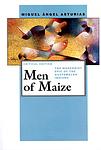The Greatest Brazilian, Guatemalan "Allegorical" Books of All Time
Click to learn how this list is calculated.
This list represents a comprehensive and trusted collection of the greatest books. Developed through a specialized algorithm, it brings together 305 'best of' book lists to form a definitive guide to the world's most acclaimed books. For those interested in how these books are chosen, additional details can be found on the rankings page.
Genres
Allegorical books are a genre of literature that use symbolic characters, events, and settings to convey a deeper meaning or message. These stories often have a moral or philosophical lesson that is meant to be interpreted by the reader. Allegories can be found in many different types of literature, including novels, short stories, and poetry. They are a powerful tool for exploring complex ideas and emotions, and can be used to comment on social, political, or religious issues. Overall, allegorical books are a thought-provoking and engaging genre that challenges readers to think critically and reflect on the world around them.
Countries
Date Range
Reading Statistics
Click the button below to see how many of these books you've read!
Download
If you're interested in downloading this list as a CSV file for use in a spreadsheet application, you can easily do so by clicking the button below. Please note that to ensure a manageable file size and faster download, the CSV will include details for only the first 500 books.
Download-
1. The Posthumous Memoirs of Bras Cubas by Machado de Assis
The novel is a unique and satirical work, narrated by a dead man, Bras Cubas, who recounts his life from beyond the grave. The story is filled with ironic humor and philosophical musings as Bras Cubas explores his past, his relationships, and the societal norms of his time. The narrative breaks conventional storytelling norms, often addressing the reader directly and jumping through time without warning. Themes of love, wealth, power, and the human condition are explored, providing a critique of 19th-century Brazilian society.
The 584th Greatest Book of All Time -
2. The Passion According to G.H. by Clarice Lispector
"The Passion According to G.H." is a philosophical novel that delves into the existential crisis of a wealthy Brazilian woman who, after killing a cockroach in her maid's room, experiences a profound metaphysical crisis. The narrative unfolds as a stream of consciousness that explores themes of identity, existence, and the nature of reality. The protagonist's journey forces her to confront her own humanity, the concept of nothingness, and the chaotic, interconnected nature of life. It's a profound and introspective exploration of the human condition and the meaning of existence.
The 1061st Greatest Book of All Time -
3. The President by Miguel Angel Asturias
The novel in question is a gripping political drama set in an unnamed Latin American country, where a ruthless dictator wields absolute power. The narrative delves into the dark and corrupt world of political machinations following the assassination of a colonel, which triggers a series of events that expose the brutal and oppressive regime. Through the eyes of various characters, including the paranoid president, the falsely accused, and the oppressed citizens, the story explores themes of power, fear, and injustice, painting a vivid picture of a society under the thumb of a tyrannical leader. The book is a powerful critique of dictatorship and a poignant exploration of the human cost of absolute power.
The 1892nd Greatest Book of All Time -
4. Men Of Maize by Miguel Angel Asturias
The book is a magical realist novel that delves into the lives, traditions, and struggles of the indigenous people of Guatemala, intertwining their personal stories with the mythic and spiritual beliefs rooted in their connection to the land, particularly the cultivation of maize. The narrative, rich in symbolism and poetic language, explores the impact of modernization and exploitation on rural communities, critiquing the forces of colonialism and capitalism that disrupt the harmony between humans and nature. Through a series of interconnected tales, the novel paints a vivid portrait of a culture in transition, grappling with the loss of its identity and the fight to preserve its heritage.
The 7168th Greatest Book of All Time
Reading Statistics
Click the button below to see how many of these books you've read!
Download
If you're interested in downloading this list as a CSV file for use in a spreadsheet application, you can easily do so by clicking the button below. Please note that to ensure a manageable file size and faster download, the CSV will include details for only the first 500 books.
Download


